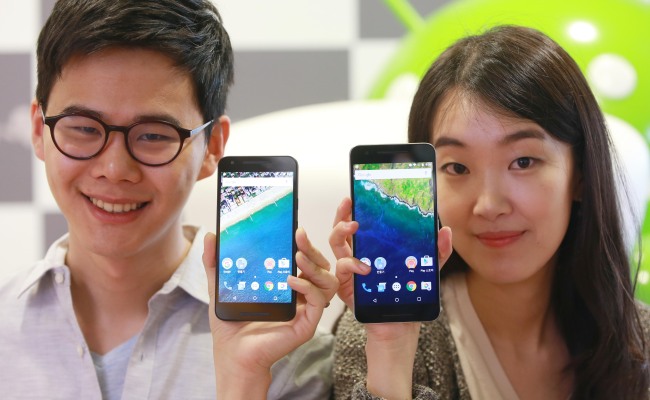South Korea is one of the world’s most connected countries, with more than 80 percent of the population owning smartphones as of this year. But spending too much time with smart devices can be a serious threat to eye health, a group of Korean ophthalmologists said this week.
According to the Korean Ophthalmological Society, one of the biggest representative bodies of eye doctors here, the number of Korean patients with dry eye syndrome has more than doubled in the last 10 years, from 970,000 to 2.1 million. The number of teen patients increased by 195 percent over the same period, while patients in their 30s and 40s increased by 207 percent.
The organization said the majority of Korean patients with dry eye syndrome are also suffering from Visual Display Terminal syndrome, a condition that results from focusing the eyes on a computer or other display devices, such as smartphones, for uninterrupted periods of time. Some symptoms of VDT include blurred vision, redness in the eyes, dry eyes, eye strain and even headaches.
According to the Korean Ophthalmological Society, one of the biggest representative bodies of eye doctors here, the number of Korean patients with dry eye syndrome has more than doubled in the last 10 years, from 970,000 to 2.1 million. The number of teen patients increased by 195 percent over the same period, while patients in their 30s and 40s increased by 207 percent.
The organization said the majority of Korean patients with dry eye syndrome are also suffering from Visual Display Terminal syndrome, a condition that results from focusing the eyes on a computer or other display devices, such as smartphones, for uninterrupted periods of time. Some symptoms of VDT include blurred vision, redness in the eyes, dry eyes, eye strain and even headaches.

Park Kyu-hyung, an ophthalmologist and a professor at Seoul National University, said exposure to blue light emitted by electronics and smartphones can be especially harmful for children aged 1-9. Blue light is the highest energy wavelength of visible light, and is capable of penetrating all the way to the back of the eye.
Overexposure to blue light emitted by smart devices can lead to a number of eye diseases including eye degeneration. Park said young children’s eyes are still developing until the age of 9, and because of that they don’t have the protective pigment in their eyes to help filter out some of the harmful blue light.
“Many children and teenagers play with their smartphones at night while lying down, with the lights off. Many do it this way so they can play with it while their parents are asleep. But this is really the worst (thing they can do to their eyes),” he told The Korea Herald.
“Our pupils get bigger in the dark, and this makes the eyes more vulnerable to the harmful effects of blue light. Children can easily develop pseudo-myopia by spending too much time with smartphones, and if untreated, this can lead to myopia.”
As of last year, 29 percent of all teenagers were at risk of smartphone addiction, while 12.5 percent were at risk of Internet addiction disorder, according to government data. Meanwhile, 80.4 percent of Korean teenagers had myopia as of last year, according to a study by the Korean Ophthalmological Society. The same study also showed that 12 percent of all Korean teenagers had high-degree myopia.
The study also found that about 50 percent of Korean elementary school children have been developing myopia since 2010, while only 10 percent of Korean children in the 1970s faced the same condition. “We believe the increased number of young smartphone users is playing a factor in these statistics,” the organization said.
Park Un-chul, an ophthalmologist and a clinical assistant professor at Seoul National University Hospital, said those with high degree-myopia have a higher chance of developing other serious eye diseases, such as glaucoma and retinal detachment.
Dr. Park said the easiest way to tackle digital eye strain is to blink more, as it helps to keep eyes lubricated. He also said that making conscious efforts to close one’s eyes or not looking at electronic device for 10 minutes in every 50 minutes can help.
Keeping one’s place not too dry or cold, and avoiding looking at smart devices while walking were also recommended. Overseas studies have found that lenses that filter out blue light can be effective in protecting eyes.
By Claire Lee (dyc@heraldcorp.com)


















![[Today’s K-pop] BTS pop-up event to come to Seoul](http://res.heraldm.com/phpwas/restmb_idxmake.php?idx=642&simg=/content/image/2024/04/17/20240417050734_0.jpg&u=)